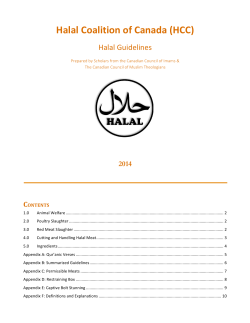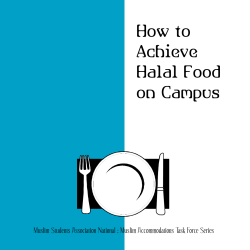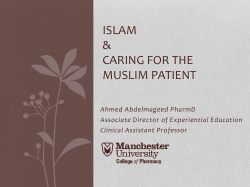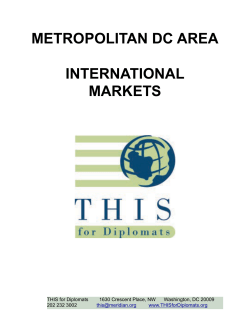
Centar za certificiranje halal kvalitete
ISLAMIC COMMUNITY IN CROATIA CENTER FOR HALAL QUALITY CERTIFICATION PERSPECTIVES OF HALAL CERTIFICATION DEVELOPMENT AND GROWTH THROUGH HALAL TOURISM: CHALLENGES AND ISSUES AUTHOR: Aldin Dugonjić CEO OF CENTER PRESENTOR: NERMIN MERDŽANOVIĆ CHAIRMAIN OF THE BOARD INTRODUCTION Products and services that are subject of exchange are not only pile of physical and useful performance, but are primarily foundation of communication with customers and users through added features. With purchase and use of certain products and services, man also expresses his other qualities, value orientation, and overall lifestyle. The important (if not most) is to recognize the motives that govern the behavior and why the consumer / user behaves in a certain way. Islam as a religion governs behavior in every human life-sphere encompassing ethical, economic, social and cultural dimensions. Because of these religious preferences Muslims follow halal way of life, in other words halal lifestyle. Therefore, there is a arising need for development of halal industry in the world. In the last decade halal industry have very positive effect on the economic development and growth especially in the food production and tourism sectors. Looking at the current world scenario, halal products nowadays receive a very high demand, approximately 20% of total food production goes for halal products while halal tourism represents 13% in the worlds' tourism activities. As such, countries around the world want to take a part into this fastes growing market in the world. Incoherent Halal Certification Processes in the World The need to establish one global Halal standard for certification as well as for accreditation is currently the most pressing issue within the Halal industry. Due to differing Halal standards not only between countries but also within same country there are confusion, and misunderstanding . The fact is that there are more than 200 institutions in 48 countries in the world accredited to issue halal certificates. Most of this institution are established in non-muslim countries and use guidelines for halal certification from the countries they usually export their goods. Due to this non uniformity in the application of Halal standards, halal certification became the subject of different personal interpretation which mostly result in confusion and scepticsm in consumers' behavior towards reliability of halal products and services. As of today several initiatives have been developed 1. SMIIC (The Standards and Metrology Institute for Islamic Countries) which already published these publications ( OIC/SMIIC 1:2011, General Guidelines on Halal Food, OIC/SMICC 2:2011, Guidelines for Bodies Providing Halal Certification, OIC/SMICC 3:2011, Guidelines for the Halal Accreditation Body Accrediting Halal Certification Bodies. 2. CEN, the European Committee for Standardization, working on development of EU norm for Halal food. 3. There are also several national norms such as HRN BAS/BAS 1049:2010, MS 1500:2004 etc. The ultimate goal of those initiatives is uniformity of halal certification processes and regulation of halal markets. Positive Experiance of Southeastern Europian Region Registration of Bosnian Herzegovinian halal standard BAS 1049:2010 and lately adaptation of the Bosnian-Herzegovinian standard BAS 1049:2010, without modifications by the Croatian Standardization Institute set the foundation of systematic ways of the application of Halal Standard and development of Halal industry in south-eastern European region. Halal Tourism: Growth and Development Perspectives Rulebook of Certifying and Categorization of Hotels and Restaurants according to requirements of Halal quality which recently have been expanded to Hospitality Services , Travel Agencies and Health Facilities . By making these Regulations Center for Halal Quality Certification has created a base for development of Halal tourism in Croatia. Regulations on the categorization of restaurants by the Halal quality requirements are categorized with: 1.HALAL LABEL PACKAGE A 2. HALAL LABEL PACKAGE B 3.HALAL LABEL PACKAGE C CONCLUSION The competitive advantage of Croatia in the development of halal industry lies in its unified ways of the application of Halal Standard. The next step would be integration and linking of all related institutions and organizations, in other words categorization of hotels, restaurants, HoReCa, marines, travel agencies, tourist boards, tourist info centres, cities, counties, agencies, ministries, medical service providers etc. By its consolidation and management creativity new market approaches could be developed which at the end might intertwines in many (profitable) ways, However, the equally important is raising awareness of availability of halal certified products and services and at the same time preventing selfdeclaration of halal products and services. The ultimate goal of halal certification is to satisfy consumer preferences and ensure reliability of products' nature. Sugesstions for Development 1. Creation of new products and services (halal certified) 2. Marketing and promotion on halal markets 3. Increase in consumption of halal products by: Raising awareness of availabilty of halal products and services Increasing demand for halal products from potential hotels and restaurants Attraction of new tourists and business people from halal markets 4. Liaison of all related economic and turistic factors Croatia is more than ready to grow its awareness of Halal diet and welcomes guests to help increase its knowledge. There is only one way for that to happen – come, visit and see what we have to offer. www.halal.hr
© Copyright 2025















